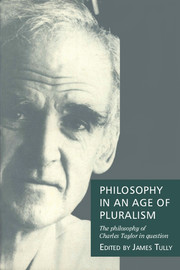Book contents
- Frontmatter
- Contents
- Notes on the contributors
- Preface
- Acknowledgements
- Introduction
- Part I Foundations
- Part II Interpreting modernity
- Part III Natural and human sciences
- Part IV Philosophy in practice
- Part V Ethics, politics and pluralism
- Part VI Reply and re-articulation
- Bibliography of the works of Charles Taylor
- Index
Introduction
Published online by Cambridge University Press: 05 June 2012
- Frontmatter
- Contents
- Notes on the contributors
- Preface
- Acknowledgements
- Introduction
- Part I Foundations
- Part II Interpreting modernity
- Part III Natural and human sciences
- Part IV Philosophy in practice
- Part V Ethics, politics and pluralism
- Part VI Reply and re-articulation
- Bibliography of the works of Charles Taylor
- Index
Summary
The contents of this volume will without doubt be occupied with a broad examination and discussion of Charles Taylor's views and position as a thinker, and I shall therefore confine myself to a purely personal expression of my conception of his personality and outlook. Let me begin by saying that I have known him since 1956 and felt the deepest friendship and admiration for him ever since. He is a man of acute intelligence, total intellectual and moral sincerity, unswerving integrity, and a remarkable insight into a variety of philosophical traditions, their central animating ideas, uncluttered by ingenious and sometimes highly complicated means of defence against actual or possible objections. His view of social and political life, to which he has devoted his thought, is imaginative, generously receptive, deeply humane and formed by the truth as he sees it, and not as it ought to be in accordance with dogmatically held premises or overmastering ideology. This gives to his work an authenticity, a concreteness, and a sense of reality which some of his less open-minded, proselytising, not to say formula- and ideology-ridden allies and disciples do not always show. He is vastly superior to them all, and, as I can testify from my own experience, a genuine source of continuous inspiration even to those who hold views very different from his own.
- Type
- Chapter
- Information
- Philosophy in an Age of PluralismThe Philosophy of Charles Taylor in Question, pp. 1 - 4Publisher: Cambridge University PressPrint publication year: 1994
- 9
- Cited by



